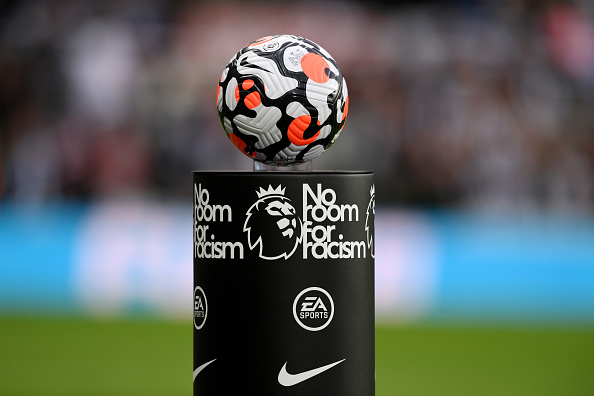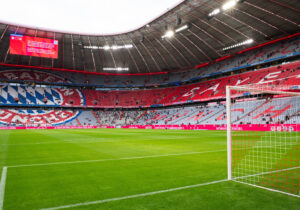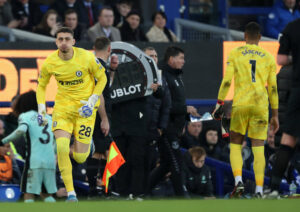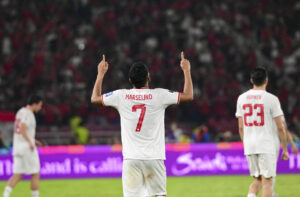When the Premier League returned to action in June 2020 after the Covid lockdown, players, managers, and referees took a knee before the games as part of the ongoing battle of tackling racism in football.
The gesture took on new meaning following the shocking death of George Floyd by a police officer in the United States.
Taking the knee was first popularised by former NFL quarterback Colin Kaepernick. He began to take a knee during the American national anthem to highlight racism in the USA and social injustice.
The Premier League has continued to take a knee before games to highlight the fight against racism. However, some players have begun not to do so, believing the gesture is losing its strength. Crystal Palace player Wilfried Zaha said the gesture was degrading. Meanwhile, Brentford star Ivan Toney said players were being used as puppets.
Over a year and a half has passed since English football started taking the knee. The big question is has it helped to tackle racism and make a difference?
Taking The Knee: Has it Made a Difference in Tackling Racism in Football?
Football, Racism and Social Media
There is no doubt that taking the knee was and still is a powerful symbol to highlight the issue of racism not only in football but in society. However, raising awareness is simply not enough. Action has to be taken to combat racism. Has much changed since taking the knee? The answer has to be not really.
The boss of Kick It Out, (football’s anti-racism organisation), Tony Burnett in October said: “I think it has been a talking point. I think we’ve just missed an opportunity.
“Part of my frustration on this is I’ve spent a lot of time in the last six months – quite rightly – talking about taking the knee.
“Actually what we need to be talking about is racism – where it comes from, how it manifests in our society, how it impacts our game, and what we need to be doing to tackle it. That discussion hasn’t been had enough.”
The biggest issue in tackling racism is on social media platforms. The Euro 2020 final saw three England players, Bukayo Saka, Marcus Rashford, and Jadon Sancho, miss penalties in the shootout against Italy, and all three were subjected to racial abuse online following the game.
If it was three white players, they probably would have been abused online too. But not because of the colour of their skin.
In the last year, Anthony Martial, Axel Tunzebe, Lauren James, Romaine Sawyers, Reece James, Alex Jankewitz, Anthony Elanga, Rio Ferdinand, and Ian Wright are just some of the many footballers to have been racially abused online.
More Needs to be Done to Tackle Racism on Social Media
Racism on social media platforms isn’t new, but year in and year out, nothing seems to be done about it. We hear the same soundbites from the Government and social media platforms saying they condemn racism and are appalled by this. They use words rather than taking substantial action.
The UK Government needs to be tougher on social media companies. It has thus far called on tech giants to tackle online abuse and provide data to police. Social media sites could also face fines if they don’t tackle racism on their platforms.
One way in which racism on social media could be tackled would be to ban anonymous accounts. In this scenario, proof of ID would be required before setting up a social media account.
Either way, more investment is needed to better police these platforms: larger punishments for social media companies who fail to regulate their platforms sufficiently; the creation of an independent social media regulator. These are just some of the steps that should be taken.
Footballers could also take a stand. Cristiano Ronaldo has over 401 million followers on Instagram. Lionel Messi has 306 million. If they delete their profiles in solidarity with their fellow professionals who get racially abused on a daily basis on these platforms, you would soon see these social media companies start to take notice and act.
Getting other social media influencers who have large followings to do the same would also send a strong message to these companies.
Premier League Needs to do More in Regards to Racial Inequality
The Premier League needs to do more to tackle racial inequality. Currently, there is just one BAME (Black, Asian, and minority ethnic) manager in the Premier League, Patrick Vieira of Crystal Palace. He is only the 10th black manager to coach a Premier League side.
According to a recent Talksport survey, 1 in 4 Premier League players is black or an ethnic minority. Even more at a grassroots level. How come this isn’t reflected in management? In the Football League, there are just three black managers.
In an interview in 2020, Burton Albion manager, Jimmy Floyd Hasselbaink said: “I know several black coaches who wanted to be coaches or wanted to be managers, who think ‘look, I’m not going to get my badges because I am not going to get an opportunity anyway, so I am going to take a different venue. I am going to go a different way.’
“So in a way, I can’t say that there is racism because I haven’t spoken to the people who are in charge you know, and they haven’t told me why but I do think that people look at black managers or coaches in a different way.”
More Diversity Needed at Management Level
An example that backs up what Jimmy Floyd Hasselbaink said is how both Frank Lampard and Steven Gerrard started their managerial careers. Lampard got a job in the second tier of English football at Derby County. Meanwhile, Gerrard started at one of the biggest clubs in the UK in Rangers.
In comparison, former England teammate Sol Campbell started in the fourth tier of English football with Macclesfield Town.
All three players played at the highest level. They have all played in a Champions League final and scored. All three played for their country at a World Cup. And all three played under some of the world’s best managers.
So why did Sol Campbell have to start at the basement of the Football League pyramid, while Frank Lampard and Steven Gerrard got better and more high-profile jobs?
This isn’t a criticism of Lampard and Gerrard. It is good to see young English managers getting a chance at a good level. However, Sol Campbell deserved that chance to.
The Premier League and Football League can have all the slogans on billboards, all the adverts that they want saying no to racism. But if it isn’t backed up at management level, if more BAME managers don’t get the chance at the highest level, all these slogans will count for nothing.
Main Photo






